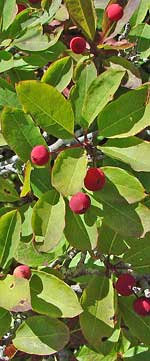Code of Conduct

- Advance your own and others' respect for and understanding of nature:
- Becoming knowledgeable serves to enhance our appreciation of nature and helps to minimize human impact on nature.
- Learn about wildlife and habitats, especially species which are endangered, threatened, or rare, and the factors that make them vulnerable.
- Share your knowledge of and respect for nature with others.
- If you find a plant, animal, or fossil that may be rare, notify your local expert, museum, or university.
- Whenever possible, volunteer to help with wildlife population surveys and other studies.
- Always put the welfare of wildlife ahead of your desire to view it:
- Moving slowly permits wildlife to become accustomed to human presence.
- Keep your visit brief and quiet.
- Keep your distance, especially from nests, dens, and other animals; never separate young from their parents.
- Use recordings and similar methods of attracting birds sparingly and not at all in heavily birded areas.
- Replace any rocks or logs overturned when searching for aquatic or terrestrial animals.
- Carefully return reptiles, amphibians, and invertebrates to their habitat if you must handle them. Better still, observe them without touching.
- Do not handle birds or mammals except in cases of emergency.
- Leave wild plants in their natural habitat and do not pick or uproot them unless they are to be destroyed through development.
- Leave fossils on-site except where they are numerous and/or likely to be damaged by erosion.
- Always preserve the integrity of natural areas and ecosystems:
- Never disturb the habitat of endangered, rare, uncommon, or threatened plants or animals, particularly during reproductive cycles or breeding seasons.
- Whenever possible stay on existing roads and trails to avoid trampling and reduce the disturbance to wildlife and their habitats.
- Carry a litter bag and carry out any trash, even if it isn't your own.
- Only you can prevent forest fires.
- Avoid supporting commercial trade in plants or animals taken from the wild.
- Always respect the rights of others:
- Be courteous to others.
- Behave in a manner that will enhance the image of naturalists everywhere.
- Respect the privacy and property of others by obeying "No Trespassing" signs and asking landowner permission before entering private or posted properties.
- Follow all rules, regulations, and laws governing public use of natural areas.
- When in groups, individuals must assume special responsibilities:
- Take care to alleviate disturbances and problems which multiply when moving through areas in groups.
- Individual actions must be in the best interests of the group but principally in the interest of nature.
- The conduct of the group must reflect a sensitivity to nature.
As a leader:
- You must assume responsibility for the group.
- You must inform the group of any special rules, regulations, or conduct applicable to the area or habitat being visited.
- You must ensure that groups are limited to a size which does not threaten the environment or the enjoyment of others.
- You must educate others to respect and enjoy wildlife and their habitats by our words and actions.
[Naturalist's Code of Conduct, adopted April 1997]

